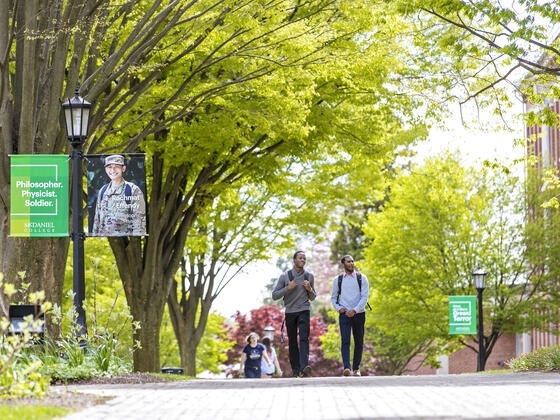You have /5 articles left.
Sign up for a free account or log in.

McDaniel College
When you think about legacy preferences in admissions—for the children of alumni—you may think of places like Harvard or Yale Universities. They are places that admit students without legacy status at rates well under 10 percent. The (few) colleges that have abandoned legacy admissions in recent years—Amherst College, Johns Hopkins University—have said they simply concluded that the practice wasn’t fair. Most of the private colleges with legacy admissions policies have kept those policies, even as they are criticized with increasing frequency.
McDaniel College also has a policy on legacies, but it’s different from the norm. McDaniel has 1,600 undergraduates, but it isn’t hard to get into. The college admits between 73 and 76 percent of applicants, and the overwhelming majority of legacy applicants are admitted without any special help. (The college receives about 5,000 applications a year.)
A liberal arts college about 35 miles from Baltimore, McDaniel depends on filling its classes for the college’s financial health.
It started its legacy program not with alumni children, but with educators’ children, in 2017. McDaniel gives $30,000 a year for four years to anyone whose parents work at a K-12 school or at a community college. That’s about half of the cost of tuition, room and board at the college.
In 2019 it added two other legacy programs: for veterans/active-duty military and for alumni. They also receive $30,000 a year for four years.
In the fall, 58 students enrolled through the program for educators, 38 enrolled for the veterans and 20 alumni children enrolled. In the last three years, there have always been more educators’ children than the other groups, followed by veterans and then by alumni children.
The 116 students enrolled represent 21 percent of the incoming class at the college.
McDaniel has a discount rate of 67 percent, although that is inflated a bit by extra aid given during the first year of the pandemic.
Neither McDaniel nor critics of legacy admissions programs know of other colleges with similar programs.
Janelle Holmboe, the college’s vice president for enrollment management, said the educators’ legacy programs was started before she was at the college, “to recognize and honor” educators. She said McDaniel has long produced a high number of educators, and the college wanted to reach them, in addition to others who work for schools or community colleges. “Most of the aid goes to students who are still not eligible for federal aid,” she said, and many of them think they can’t afford a private college.
And she stressed that the program is open to anyone who works at a school or community college. “We’ve had cafeteria workers’ children,” she said.
The college does require students to stay enrolled full-time, and to live on campus, but most students live on campus anyway, Holmboe said.
Holmboe said that she has been wondering, as criticism of other colleges’ legacy programs has increased, if she would face a backlash. But so far, she hasn’t heard anything.
She says the college’s approach puts alumni contributions in context. They are important to the college, but so are other things.
“This is about the service provided by educators, veterans and alumni,” she said.
To get more applicants, the college recruits at high schools in the area near the college. Holmboe said the college always leaves fliers and then hears from people about the offer.
The program is actually a recruitment program, she said. There is “no doubt” in her mind that McDaniel enrolls students who wouldn’t have otherwise applied.
Holmboe said she thinks of her father when she works on the program: he was a vice principal in a high school and had two daughters with college ambitions.
The Reaction From Legacy Critics
McDaniel may not have faced the backlash that Holmboe worried about. But that appears to be because the programs are not known by the main critics of legacy admissions. Last month, a new bill was introduced in the U.S. Senate and the House of Representatives that would ban any college that participates in federal student aid programs from offering admissions preferences to children of alumni or donors.
Michael Dannenberg, vice president for strategic initiatives and higher education policy at Education Reform Now, said that he applauded McDaniel for offering aid to those whose parents work in education or the military. But he said that didn’t justify the aid going to alumni children.
He said via email, “With regard to financial aid dedicated to the children of those who work in public service, which is a good thing, vs. financial aid dedicated for the children of alumni, which is a bad thing, it’s not as if the former justifies the latter. But in truth, the latter is just another way all too many colleges choose to advantage the already advantaged.”
Dannenberg continued, “Financial aid exclusively for legacy students just like the legacy preference in admissions typically undermines diversity, doesn’t reward individual achievement, and diverts scarce resources from talented, working class and needy students. Colleges should stop doing both.”
Viet Nguyen last year started a group of young alumni who said they would not donate to their alma maters as long as they continued legacy admissions.
Asked about the McDaniel program, he didn’t address it. “We are excited by the bill proposed in Congress to end legacy and donor preferences and [I] am actively working with states to do the same,” he said via email. “Legacy admissions perpetuates cycles of inequity and racism. We look forward to a day when one’s family linage plays no role in the college application process.”




